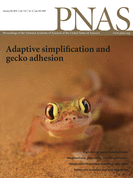 Back in November 2013, we wrote about a correction in PNAS about a May 2012 paper by a group from Toronto and Mount Sinai in New York who, as we said at the time
Back in November 2013, we wrote about a correction in PNAS about a May 2012 paper by a group from Toronto and Mount Sinai in New York who, as we said at the time
had been rather too liberal in their use of text from a previously published paper by another researcher — what we might call plagiarism, in a less charitable mood.
Continue reading Authors get away with throwing quotation marks around plagiarized passages. Again.







